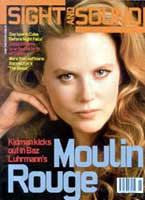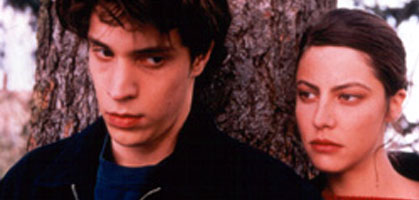
Merci pour le chocolat
France/Switzerland 2000

Reviewed by Keith Reader
Synopsis
Our synopses give away the plot in full, including surprise twists.
Lausanne, Switzerland, the present. Marie-Claire 'Mika' Muller (Isabelle Huppert), managing director of a chocolate company, is remarrying André (Jacques Dutronc), the concert pianist to whom she was briefly married 18 years before. During their time apart André had married Lisbeth, now dead, and raised his child Guillaume (Rodolphe Pauly). Rumours abound that Guillaume had nearly been exchanged with another baby at birth.
That baby is now piano student Jeanne (Anna Mouglalis), a the daughter of forensic scientist Madame Pollet (Brigitte Catillon) and lover of her trainee Axel (Mathieu Simonet). On discovering the mix-up that occurred at the clinic where she was born, Jeanne visits André and an instant affinity between the two makes itself felt. Jeanne is told that Lisbeth died after falling asleep at the wheel of her car. Mika drops a flask of the hot chocolate she regularly prepares in a way that raises Jeanne's suspicions. Jeanne has her pullover, stained with the chocolate, analysed by Axel and discovers that the drink was spiked with the sleeping drug rohypnol. Guillaume dismisses Jeanne's fears that the spiked drink could have been meant for him, and reveals that when Lisbeth was killed she and André, short of funds, had been staying with Mika. Jeanne is invited to spend a few days studying the piano with André, and is told by her mother that she was conceived by artificial insemination.
At dinner Mika reveals that she was an adopted child. She encourages closeness between Jeanne and Guillaume, and 'inadvertently' spills hot water on her stepson's foot. André has run out of rohypnol, to which he is addicted. Accompanied by Guillaume, who now shares her suspicions, Jeanne drives into town to collect a fresh supply. André accuses Mika of Lisbeth's death by spiking her cognac with rohypnol. Mika owns up. It becomes plain that she has also spiked the after-dinner coffee when Jeanne is overcome by somnolence at the wheel; her car crashes into a wall. Neither Jeanne nor Guillaume is hurt. Mika passively awaits justice.
Review
Claude Chabrol's fifty-third feature film is also one of his most atmospheric. The plot offers the usual noiresque amalgam of doublings (two weddings, two car crashes engineered by the film's central character, Mika Muller, the MD of a Swiss chocolate firm who is suspected of murdering her husband's previous wife) and family romance (hardly anybody seems sure who their real parents are). These familiar generic trappings are given a fresh impact by being staged in the comically stilted and lethargic environment of the Swiss haute bourgeoisie. The lakeside scenes provide only intermittent relief from the turgidity of the chocolate company board meetings, the stiffness of the wedding reception (celebrating the remarriage of Mika and her former husband André), or the claustrophobia that permeates the spacious Muller mansion. Mika may bring her stepson a Fritz Lang video as a gift, but of Chabrol's two tutelary deities it is Hitchcock who is dominant here: in the knowingly sinister use of staircases and mirrors; the increasing sense of déjà vu that, Vertigo-like, tightens around the protagonists; above all in Isabelle Huppert's performance as Mika, which has echoes of Ingrid Bergman's in Notorious (1946) or even, as she neurotically polices the family mansion, of Judith Anderson's Mrs Danvers in Rebecca (1940). At times Mika's demeanour almost suggests that it is she, not her husband, who is addicted to sleeping pills. Her apparent catatonia works magnificently as the symptomatic expression of a repetition compulsion that exhausts those who suffer from it - and her drained admission of unworthiness at the end, abetted by the fact that neither of the two people whom she attempts to murder is hurt, makes it impossible to regard Mika as anything other than a victim.
Merci pour le chocolat is a superb close-up film. The academic Guy Austin recently pointed out how 'enigmatic and ultimately disembodied female protagonists' are a key element in Chabrol's cinema, and Huppert's scenes with Anna Mouglalis, who plays Jeanne, the music student who befriends Mika's pianist husband, are the most recent - and among the most powerful - instances of this. The film's claustrophobia thus reveals itself as double-edged. On the one hand, the number and intensity of the facial close-ups suggests the emotional tightening of fraught, complex family relationships; on the other, the world outside - at a private view, a board meeting - offers scarcely any sense of spatial respite. At one point Mika promises (threatens?) to make 'Aztec chocolate' - confectionery enlivened with a fiery array of aromatic spices. As a metaphor for the world of Merci pour le chocolat - mellifluous and bland on the one hand, seething with repressed heat on the other - this would be hard to beat. After the pallid capers of Rien ne va plus, and the failure of Au coeur du mensonge to secure UK distribution, French cinema's definitive Comeback Kid has done it again.
Credits
- Director
- Claude Chabrol
- Producer
- Marin Karmitz
- Screenplay
- Claude Chabrol
- Caroline Eliacheff
- Based on the novel The Chocolate Cobweb by
- Charlotte Armstrong
- Director of Photography
- Renato Berta
- Editor
- Monique Fardoulis
- Art Director
- Yvan Niclass
- Music
- Matthieu Chabrol
